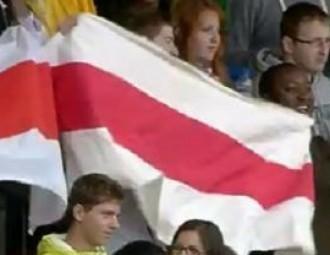Belarusans prevented from displaying white-red-white flag during hockey game in Stockholm

The incident occurred during a world championship game in Stockholm on May 5. Swedish security guards used force to prevent Belarusan ice hockey fans from displaying a white-red-white flag.
Friday’s clash between Belarus and the Czech Republic saw a group of fans drape the huge white-red-white flag and a Pahonia emblem behind one of the gates. The game was broadcast live by state television network Belarus Two, and hundreds of thousands of viewers saw the symbols as they repeatedly came into view. A scuffle broke out when police officers tried to remove them, but Swedish fans came to the aid of the Belarusan group. As a result, the symbols were not removed from the stands until the end of the game.
The organizers of the championship subsequently warned that Belarusan fans would not be allowed to hockey arenas again if they brought along unofficial symbols, reports BelaPAN.
The BNR Rada (government in exile of the 1918 Belarusan National Republic) has called on Swedish authorities to investigate why “people in uniform had used violence against activists of an organization called Belarusan National Memory,” in Stockholm on Sunday.
The BNR Rada points out that the white-red-white flag was not a symbol of any political party.
Let us recall that historically national white-red-white flag had been Belarus` state symbol until a 1995 national referendum, which marked the beginning of a full-scale crackdown on the rule of law, democracy and human rights in Belarus and was marred by flagrant violations of the constitution and other regulations, the statement says.
The BNR Rada describes the behaviour of the security guards as “an insult to the national honour and dignity” and calls on the International Ice Hockey Federation (IIHF) to take measures to guarantee respect for state symbols and human rights during hockey tournaments.
The BNR Rada also expresses indignation at “questionable remarks about black fans” by Yauheni Vorsin, chairman of the Belarusan Ice Hockey Federation.
“Such remarks are not only unacceptable in the civilized world but also run counter to the Olympic spirit itself.”
In an interview for European Radio for Belarus, Vorsin said, “I think that the game had drawn some people from the outside who had probably been paid and not fans, considering that there were blacks among them, God knows who, some rabble. They stood and shouted God knows what. It is unclear what caused their excitement. Just crazy people. I don’t think they were fans. I suppose that no one paid attention to them. We did because we thought that that might have been a provocation, that’s all. But I repeat that they were people hired by someone and not fans.”
Tony Wirehn, general secretary of the Swedish Organizing Committee for the 2013 World Ice Hockey Championship, told the Belarus Service of Radio Free Europe/Radio Liberty that no one would be allowed to attend championship games if they carried white-red-white flags. The IIHF rules do not allow the display of any political symbols during hockey games, he explained.
Former Swedish Ambassador Stefan Eriksson, who was expelled from Belarus last summer, wrote on Facebook that he was alarmed by the May 5 incident. “Of course, I don’t like this story,” he said. “I do everything I can. However, it is necessary to apply pressure from every direction to influence a powerful organization such as the international association. In general, I think that the guys [Belarusan fans] have already done a lot. I think that this issue will be further discussed.”
During the European Parliament’s discussion of the Belarus issue in Brussels on January 12, 2011, many MEPs put on white-red-white scarves in solidarity with the political prisoners in Belarus.
While speaking at the meeting, European Parliament President Jerzy Buzek suggested barring Belarus from international sports events, such as the Olympic Games and the FIFA World Cup.
In a resolution adopted in March 2012, the European Parliament proposed that the International Ice Hockey Federation should consider relocating the 2014 championship from Belarus to another host country "until the regime shows commitment to human rights and the rule of law."
The white-red-white flag and the Pahonia emblem were Belarus` state symbols between 1991 and 1995. In the controversial 1995 national referendum, held on President Aliaksandr Lukashenka`s initiative, 75 per cent reportedly voted for their replacement by Soviet-style state symbols, with 65 per cent of those eligible taking part in the vote.
Pressing for replacing the white-red-white flag, Lukashenka explained that this flag had been used by the Belarusan collaborators of the Nazis.
After the 1995 referendum, the white-red-white flag became a symbol of opposition to the Lukashenka government and an indispensable attribute of street protests in the country. In this quality, the flag strongly irritates police and government officials. A public display of this combination of colours may entail a sizable fine or several days in jail.
-
03.01
-
07.10
-
22.09
-
17.08
-
12.08
-
30.09










































